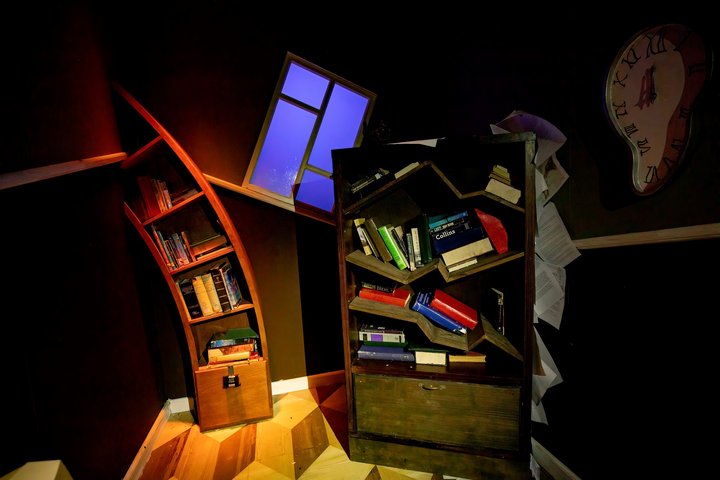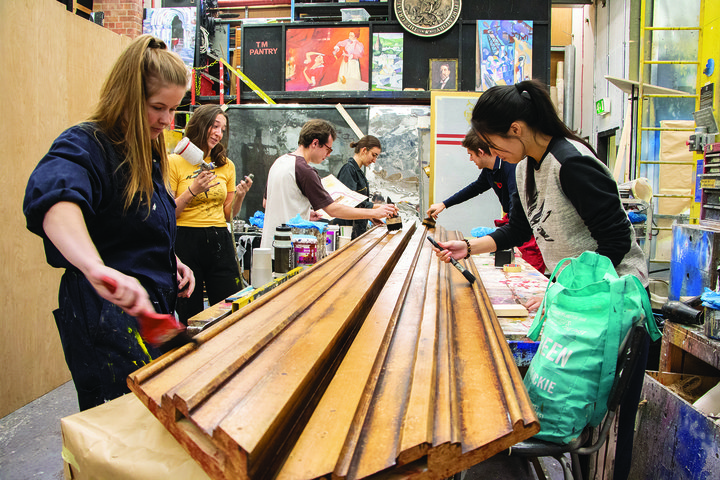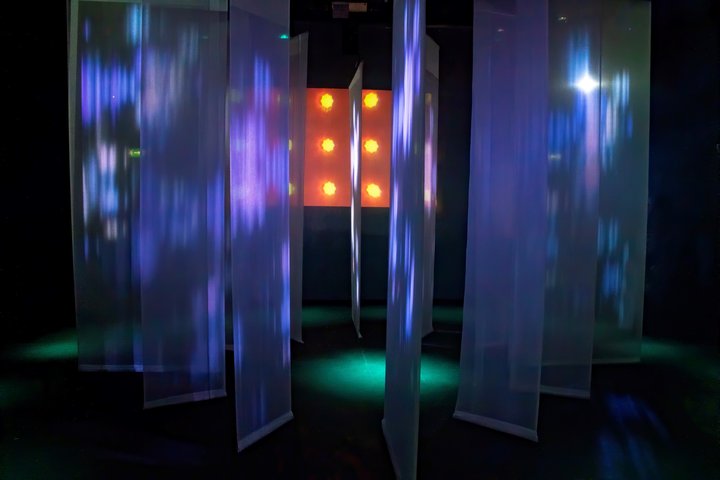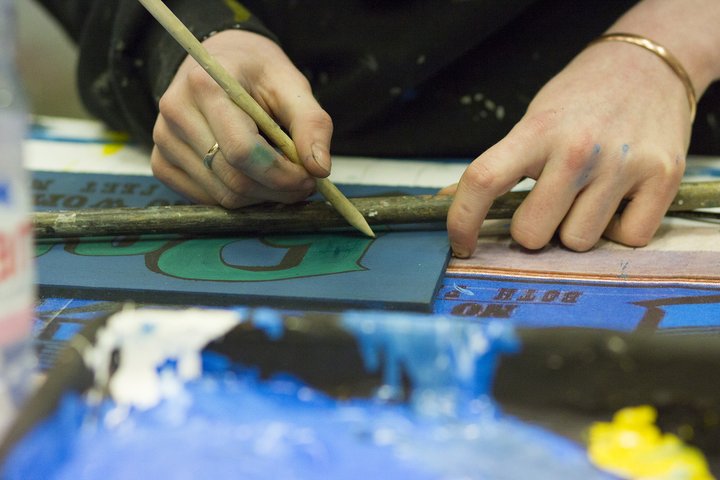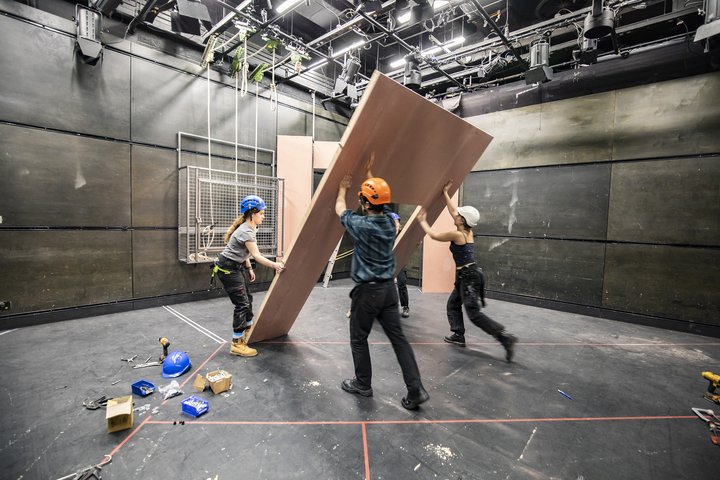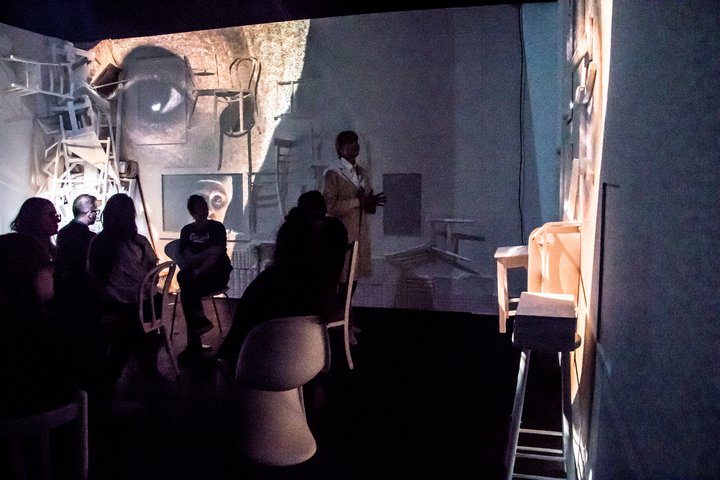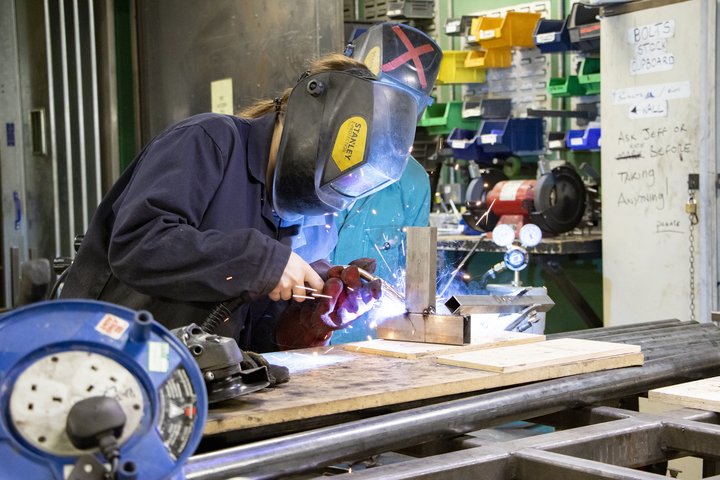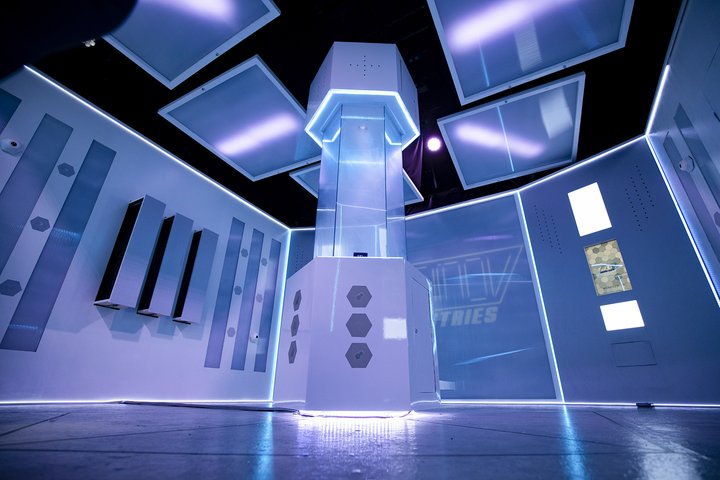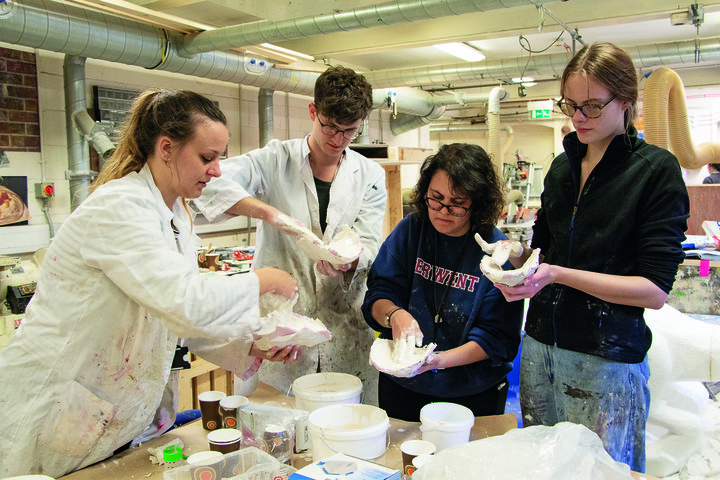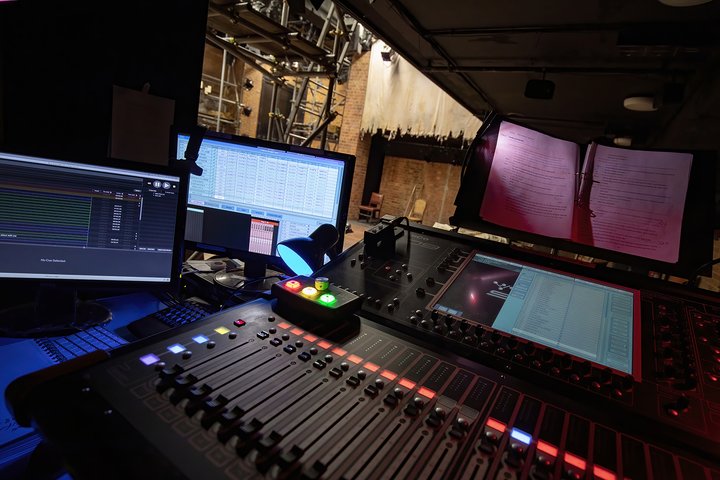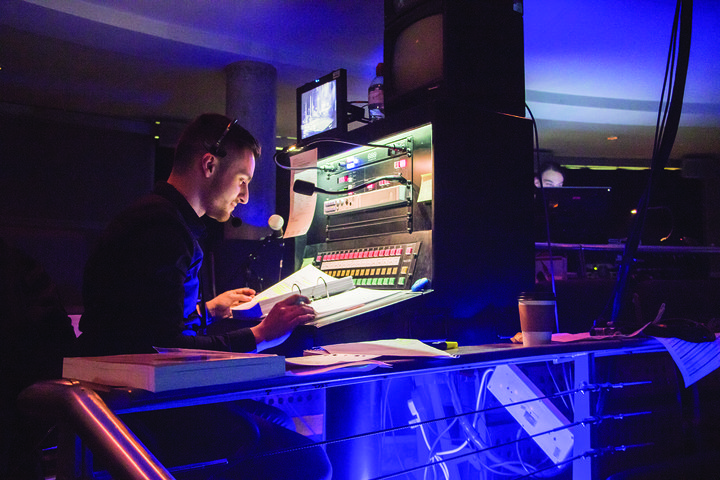FdA in Technical Theatre & Stage Management
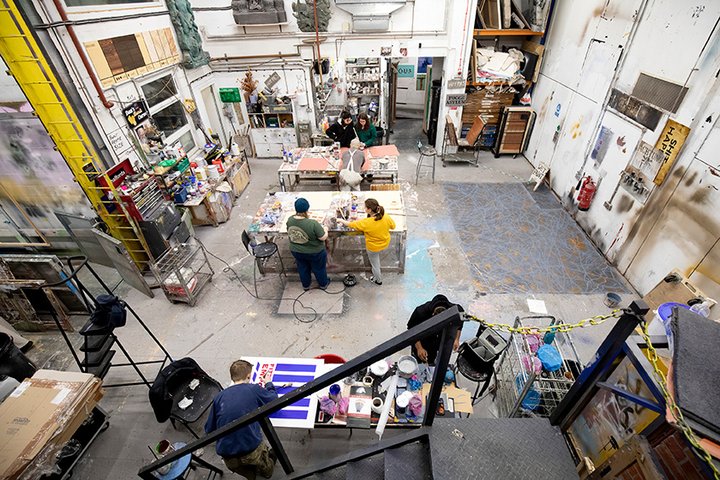
We enable exceptional technicians, managers, designers and makers to thrive in the arts.
By combining practical and theoretical classes with work on public productions, we will support you to establish a career as a highly-skilled, curious, and creative theatre-maker.
Our world-leading training responds to a continuously evolving industry and will prepare you to work in theatre, film, television, radio, digital media, events management and production.
We believe a thorough grounding across all areas of production enables you to become a successful specialist. At RADA you can focus on stage management, lighting, sound, props, scenic art, construction, costume, technical and production management.
We support our students to develop their individual practice, work collaboratively and feel empowered to explore new ideas.
Working in a supportive and equitable environment with creative collaboration at its heart, you will graduate with the potential to become a leader and change-maker in the arts.
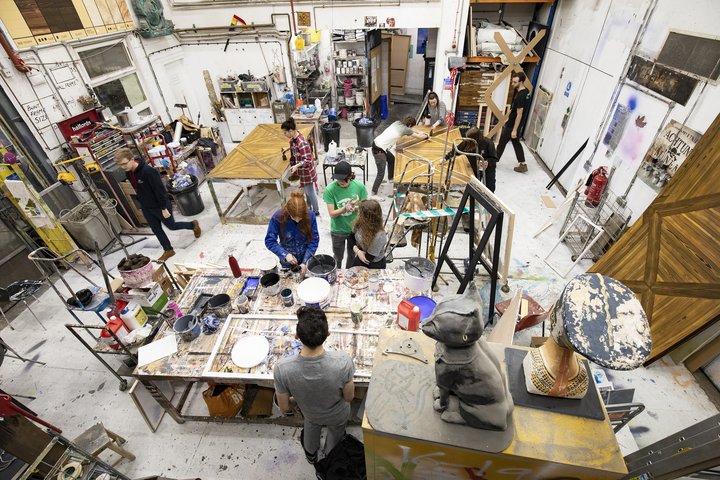
At RADA, you learn by doing. You will engage in hands-on, vocational training that immerses you in theatre production, ensuring you're fully equipped for success in the industry. Throughout your training, you'll receive personalised career guidance and professional development to help you choose your specialism and thrive in your chosen field.
Our work is practical and collaborative; there are no academic essays or dissertations. You will be asked to write a short self-assessment every six weeks and work on professionally-focused written tasks like drafting risk assessments and creating technical schematics.
Core disciplines include:
- Stage Management
- Prop making
- Costume and Wardrobe
- Scenic Construction
- Scenic Art
- Lighting
- Sound
We understand that you need a broad understanding of the world you're entering, along with the skills necessary to excel in your chosen field. Our training is built around three core strands:
- Context – historical, architectural, cultural, social, managerial
- Design
- Stagecraft and Production
Over two years, the course will enable you to:
- Cultivate your practical and theoretical understanding of technical theatre and stage management as part of a dramatic performance or project.
- Build a strong engagement with the complex and interconnected disciplines that make up technical theatre arts.
- Develop your analytical and problem-solving skills in order that they can be applied in technical theatre, other related performance industries and the wider world.
- Enhance your ability to conduct research, evaluate evidence, make appropriate arguments and communicate effectively.
- Encourage your ambition to aim for a career at the highest level
- Be courageous, curious and socially engaged in your work.
Students benefit from the RADA Buddy mentoring scheme, which supports your transition from student to professional with graduate ‘buddies’ providing professional advice, feedback and networking opportunities.
Although the Foundation degree is intended as a complete vocational training in itself, students who pass our FdA will now automatically be considered for the BA (Hons) progression year - enabling students to deepen their specialist knowledge further in one or two areas of technical theatre or stage management.
For more detailed information on course content, assessment and outcomes, download our Programme Specification.
Timetable and workload
This programme is taught in-person, with at least 35 contact hours per week on average. Production periods may require longer hours, including evenings and weekends.
Training is mostly onsite at RADA with occasional online and offsite sessions.
Assessment
The FdA in Technical Theatre and Stage Management is a vocational course. You will be assessed entirely on your practical work.
Assessment follows five rotations or blocks of performance throughout the year, where you will be assessed on production roles, project work or placements.
You will also complete a self-assessment, which is an opportunity to reflect on your learning.
This programme can lead to one of two awards:
- Foundation Degree (FdA) on successful completion of all level 4 and 5 modules
- Certificate of Higher Education (CertHE) on successful completion of all level 4 modules
Find our term dates here.
Year 1
During the first year you will explore all areas of technical theatre production through rotational learning. You will quickly begin using these skills in public productions and events. Alongside this, you will receive ongoing training throughout the year in a number of areas, including stage management, theatre history, and stage, costume, light and sound design.
To help give a broader context for your work, we invite a number of guest speakers from a wide range of industries and walks of life including politics, arts, science and social justice.
Year 2
After a broad-based first year of training, your second year gives you the opportunity to specialise in the area that interests you most. You can choose from stage management, lighting, scenic construction, technical management, sound, property making and supervision, production management, scenic art, or costume making and costume suprervision.
In addition to taking on more senior production roles, you will have the chance to sharpen your skills through project work or by participating in alternative theatre projects or digital production.
You will also complete a professional placement, lasting up to six weeks, with a theatre company, organization, or practitioner.
The Foundation Degree is designed as a comprehensive vocational course, but on completion of the programme you will then be able to apply for the BA (Hons) progression year, which enables you to deepen your specialist knowledge in one or two areas.
We encourage applications from people of any age, gender, disability, ethnicity, marital status, nationality, sexual orientation, parental status, socio economic status, religion or belief. We are committed to promoting equality and diversity, to pursuing non-discriminatory policies and practice, and eliminating unfair discrimination.
Entry Requirements
We require you to have achieved a standard of education which means you can study for a foundation degree, but we do not require specific A levels or other qualifications. All eligible applicants are invited to a workshop and interview.
You must:
- be 18 years old by the first day of the induction week in your programme of study
- have complete fluency in spoken and written English
- have some practical experience of theatre production disciplines or related activity
- demonstrate an intellectual, creative and practical ability to undertake foundation degree training
- be able to talk enthusiastically about your passion and experience at interview
- be able to show an understanding of the nature of the work.
Find out more about our English Language requirements here.
How to apply
- Complete the online application form at the top of this page.
- If your application is successful, you will be invited to an interview and practical session.
- There is no fee to apply for the FdA in Technical Theatre & Stage Management.
- Read our guide to the application form.
- You may be eligible to apply through our RADA Connect programme.
Admissions process
As part of the admissions process there is a practical workshop and interview, which will be scheduled on the same day. We expect these to be in-person, on-site, at RADA. If you are successful, you may be offered a place immediately after the workshop day.
If you live outside of the UK, and coming to RADA is not an option for you, please contact admissions@rada.ac.uk.
Please note that, due to the volume of applicants we interview, we cannot provide feedback.
Information for disabled applicants
We welcome applications from disabled applicants and encourage them to disclose relevant information regarding any disability when completing their application form, to enable us to provide additional support during the admissions process. Find out more about the ways RADA support disabled applicants in our Student Life pages.
If you are a disabled applicant and would like further advice or guidance, please contact the admissions team directly on admissions@rada.ac.uk.
- Read more about how we support disabled applicants in our admissions procedure guide.
- Find out more about the ways RADA support disabled applicants in our Student Life pages.
Tuition fees
*subject to parliamentary approval.
Undergraduate fees:
Home (UK) students
£9,790 per academic year
International students
£26,500 per academic year
Other costs
Almost all materials and resources you require for your courses, including travel for any trips, are included in your tuition fees.
You will undertake a placement of up to six weeks as part of this course. For the majority of students, this will not mean any additional costs. You can apply for additional financial support from RADA if your placement means that you incur additional costs, such as travel.
Other materials costs: £300 + laptop
The things not covered include protective footwear, practice clothes, play texts and stationery. International students will have costs associated with the Student visa. Please visit the UK Visas & Immigration website for further details.
Laptops, phone/tablet devices and related equipment
To participate in this course, including online training, you will need to have suitable equipment.
Prices for laptops may vary but costs are likely to be in the region of £550 and upwards. Educational discounts are available, so we advise that you wait until you are enrolled before buying any new equipment. We recognise that not all applicants/ students will own this equipment or be in a financial position to purchase it. RADA, therefore, has ways in which we can provide you with support to ensure that you can access the equipment you need.
Please see the fees policy for more information about how RADA calculates tuition fee increases for each year of a course.
Find out more about funding your training.
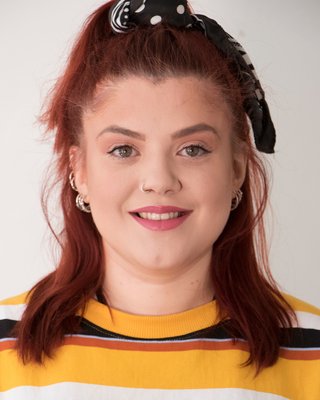
Applicants must be at least 18 on the first day of the induction week in the year that you start your programme of study. We offer other opportunities for young people under 18 including Access and Participation projects and Short Courses.
There is no upper age limit to apply and we welcome applications from people of all ages over 18.
RADA does not use the UCAS service for applications and we have an independent admissions process. Apply via the online application form at the top of this page.
We require you to have achieved a standard of education which means you can study for a foundation degree, but we do not require specific qualifications or A-Levels. All eligible applicants are interviewed. The panel will be looking at experience, but also at your suitability for the training and passion for the subject.
We no longer produce a physical prospectus. All our information on full-time courses can be found on the RADA website, including course content, costs and funding, graduate destinations, the application process, welfare support and where to live.
You will receive an automated email confirming receipt of your application when you have submitted it. We will then contact you with a date for your interview. Interviews are likely to start in December 2025.
If you are ill on the day, please email admissions@rada.ac.uk in advance of your interview time.
Where possible, we will try to provide an alternative date, but this may not be possible as it is dependent on where we are in the admissions process.
No. You should apply for a place in the year before the September you wish to begin your training.
There are different fees for UK and international students. You must have lived in the UK for three consecutive years prior to starting the course in order to qualify for UK level tuition fees.
Learn more about funding your training.
Course hours will regularly include evenings and Saturdays, especially during production weeks, so there would be little opportunity to work during term time.
It is important that students have a balance of study and rest throughout their time at RADA to enable them to complete their training satisfactorily. Note that a formal work placement is part of the FdA in Technical Theatre and Stage Management.
There is an intake of 30-36 students each year, typically taught in groups of 6.
You can find our term dates here.
Generally, we do not accept student transfers (direct entry) into our higher education courses. For our higher education Theatre Production courses (FdA Technical Theatre and Stage Management, one-year BA (Hons) Technical Theatre and Stage Management top up award and PgDip Theatre Costume), we are unlikely to accept students part-way through the course.We take students from other institutions into the BA (Hons) in Technical Theatre and Stage Management (Progression year), but they must follow the usual admissions process for that course.
We are not able to support students transferring between courses at RADA, particularly between acting and theatre production degrees as these are very different and vocational pathways. A student wishing to change direction would need to be interviewed or auditioned to join one of the other courses.
To participate in this course, including online training, you will need to have the equipment. We recognise that not all applicants/ students will be in a financial position to purchase this. Please see 'other costs' in the Costs and Funding section for more information and contact the admissions team by emailing admissions@rada.ac.uk.
Read our regulations and policies relating to admissions and current students here.

